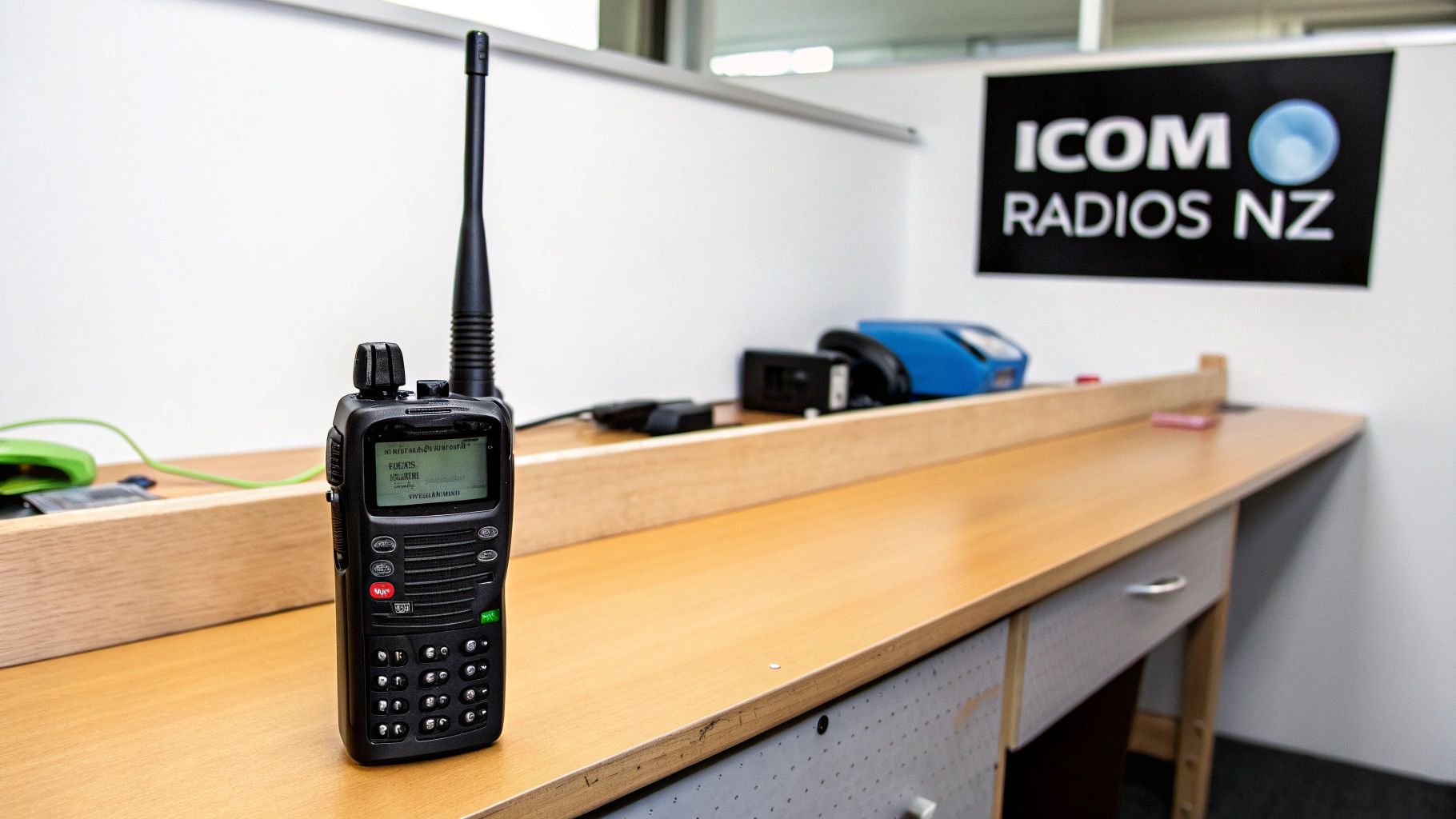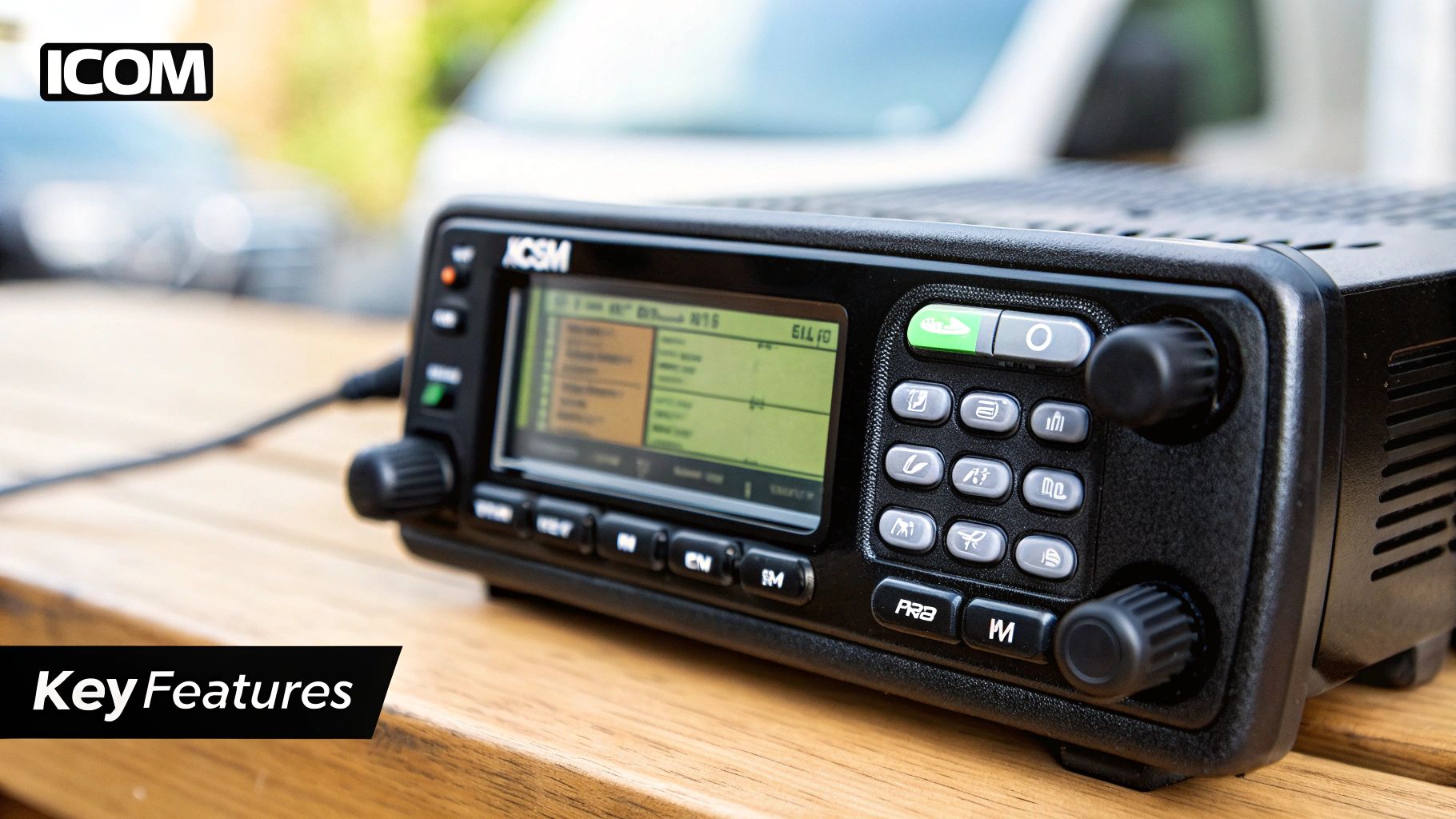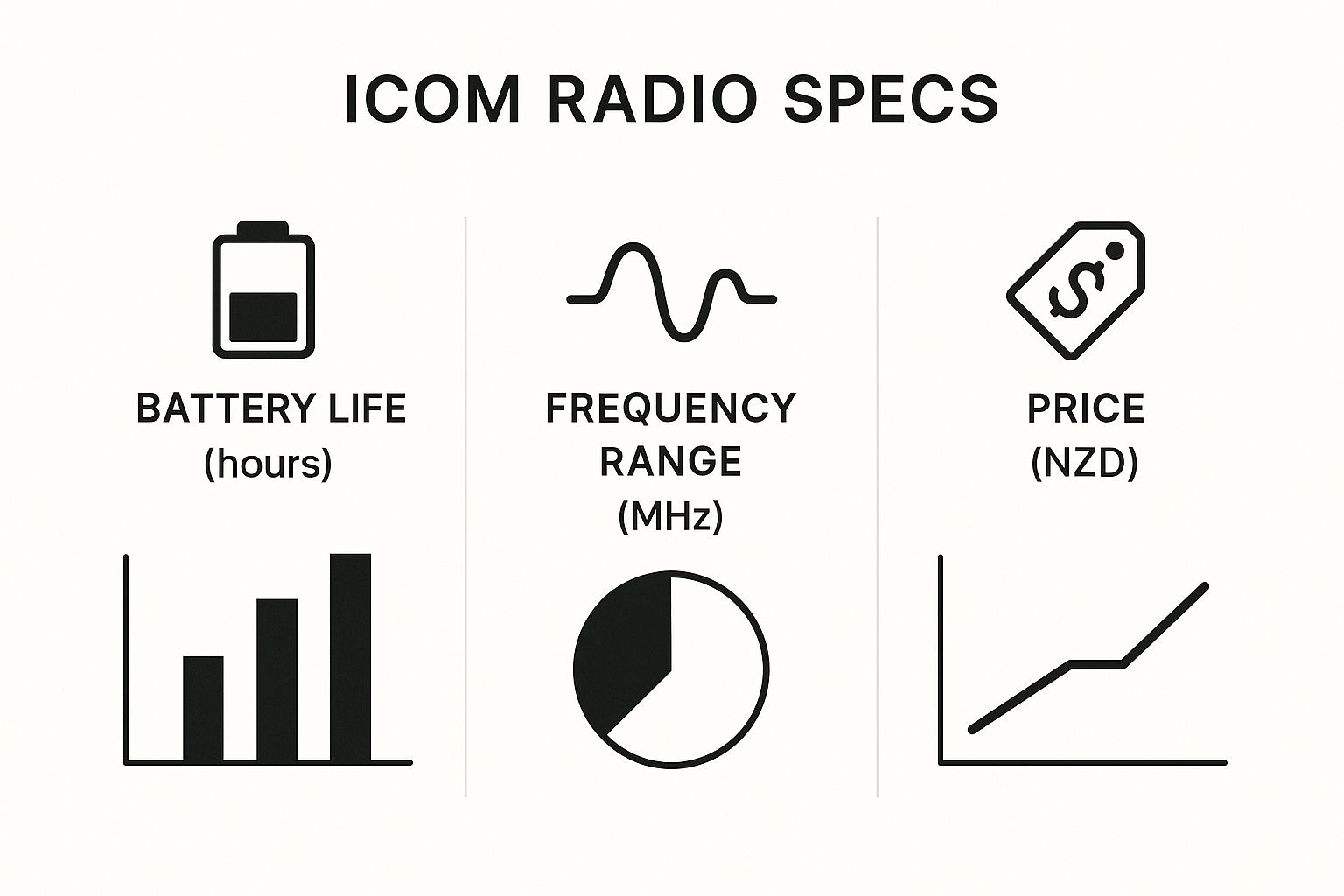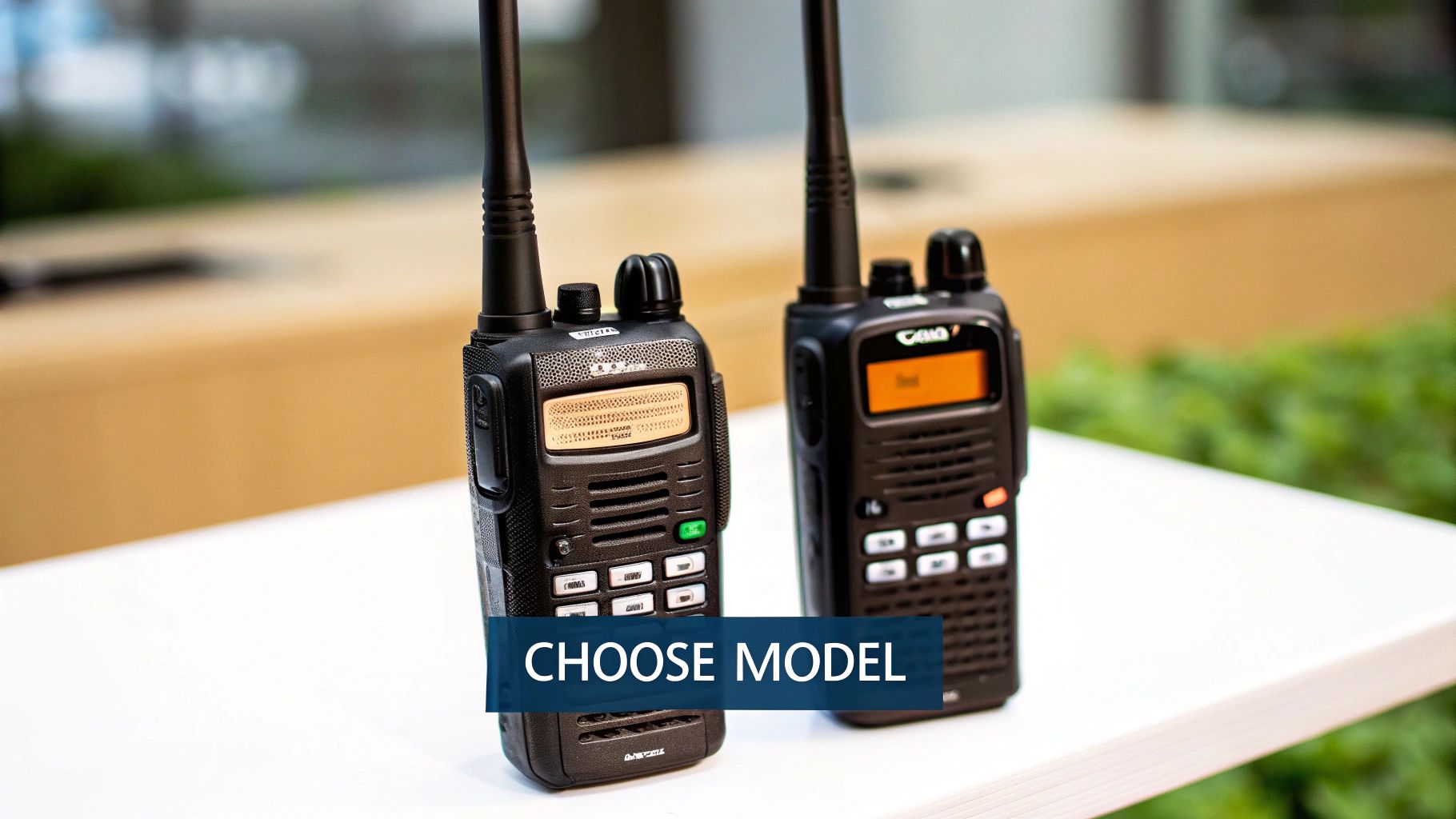A Guide to Icom Radios in NZ: Legal Communication Solutions
vhfYour complete guide to Icom Radios NZ. Discover top models, NZ licensing rules, and how to choose the right radio for professional or personal use.
When you need communication you can count on, especially in New Zealand's varied and often challenging environments, Icom radios are the gear you want in your hand. From remote forestry operations to the critical coordination of our emergency services, Icom has built a solid reputation for delivering reliable communication solutions when it matters most.
What Makes Icom a Top Choice in New Zealand

Here in Aotearoa, Icom has established itself as a leading provider of legal communication devices by focusing on what truly counts: durability, clear audio, and designs that are practical for field use. This isn't just about having a radio that works; it's about having a legal, licensed communication lifeline you can trust when conditions are tough and a clear message is non-negotiable.
Think of it like choosing the right tool for a critical job. You wouldn't use an unlicensed vehicle for commercial transport—you’d use a certified, purpose-built one. The same logic applies to professional communications. Icom radios NZ users choose them because they are engineered for specific, often harsh, environments and can be legally licensed for private, interference-free channels.
Built for New Zealand's Varied Conditions
The brand's success is rooted in its ability to provide compliant communication solutions for a wide range of Kiwi industries, each with unique operational challenges. Whether you're coordinating logistics on a busy Auckland construction site or ensuring crew safety on a fishing charter off the Coromandel coast, Icom delivers gear that performs reliably within legal frameworks.
- Rock-Solid Reliability: Built to last, many Icom radios feature high IP ratings for dust and water resistance, making them ideal for tough sectors like farming, construction, and marine industries.
- Exceptional Audio Quality: In noisy environments—from factory floors to boat engine rooms—Icom’s advanced audio technology cuts through the background noise, ensuring your voice is heard clearly.
- Diverse Product Range: Icom offers a comprehensive lineup of legal communication solutions, from compact handheld units to powerful in-vehicle mobiles and fixed base stations for command centres.
A Key Player in a Niche Market
New Zealand's radio landscape is more complex than many realise. Beyond public broadcast stations, there is a vast network of specialised two-way communications essential for commerce and public safety. This is where Icom truly excels.
In this specialised space, particularly among New Zealand's thousands of licensed amateur radio operators ("hams"), Icom is a dominant name. This community is vital, providing recreational and emergency communication links in big cities and small towns like Tokoroa and Taupō alike. You can learn more about the diverse structure of radio in New Zealand and Icom's role here.
Icom's key strength is serving both professional industries requiring licensed channels and the passionate amateur radio community. This dual focus means its technology is constantly field-tested and refined, making it a robust and legal communication solution for any challenge New Zealand presents.
Understanding NZ Radio Licensing Requirements

Operating a two-way radio in New Zealand is not a free-for-all. The airwaves are a finite public resource, managed by Radio Spectrum Management (RSM) to ensure they remain clear and functional for all users, from emergency services to commercial businesses.
Think of radio frequencies as lanes on a motorway. Without proper allocation and rules, you’d have constant chaos, interference, and dangerous communication failures. Non-compliance can lead to significant fines, but more importantly, it could interfere with critical services when they need a clear channel the most. Navigating these legal requirements is the first step in setting up a reliable communication system.
General User Licences vs Dedicated Licences
For many Kiwis, the simplest way to legally get on the air is with a General User Radio Licence (GURL). This isn't a physical licence you apply for; it's a set of public frequencies that anyone can use, provided their equipment meets the technical standards set by RSM.
A classic example is the set of UHF CB (Citizen Band) channels. If you purchase a standard UHF CB radio for your 4WD club or farm, it’s designed to operate legally under a GURL. You can use it straight out of the box with no further paperwork.
However, these shared frequencies can be prone to interference from other nearby users. For a professional operation where clear, private communication is a necessity—such as a large construction site or a port's logistics team—a GURL is inadequate. This is where dedicated licences are essential.
A dedicated radio licence, issued by RSM, grants your business exclusive use of a specific frequency within your operational area. This is your private lane on the communication motorway, guaranteeing the clear, interference-free channels that are fundamental for safety and efficiency in most commercial environments.
The Path for Amateur Radio Operators
The amateur radio community, known as "hams," follows its own distinct licensing pathway. These enthusiasts form a vital part of New Zealand’s communication network, especially during emergencies when other systems fail. To become a ham, an individual must pass an examination to demonstrate technical knowledge and understanding of radio regulations.
The New Zealand Association of Radio Transmitters (NZART), founded in 1926, is the cornerstone of this community. With around 80 local branches, it supports hobbyists who often rely on high-quality gear from brands like Icom, known for their powerful high-frequency radios. Given New Zealand’s seismic risk, this community provides a critical communication lifeline. You can learn more about the history and role of this important organisation at NZART.org.nz.
Upon certification, RSM issues a unique call sign, which is the operator's licence to access specific amateur frequency bands. This licence reflects a commitment to skilled and responsible radio operation.
Which Licence Do You Need?
Determining your licensing needs is the first step, even before you start looking at professional-grade Icom radios in NZ.
Here’s a simple breakdown:
- For casual, non-business use: A standard UHF CB radio operating under the GURL is almost certainly the correct legal choice.
- For business or critical operations: A dedicated radio licence from RSM is non-negotiable. This is required for private, reliable channels.
- For hobbyist radio communication: You must pass the amateur radio exam to obtain your official call sign and licence.
The simplest way to ensure compliance is to partner with a professional communications provider. We can assess your operational needs, manage the RSM licensing application on your behalf, and program your Icom radios to your legally allocated frequencies, ensuring you are set up correctly from day one.
How to Choose the Right Icom Radio
Feeling overwhelmed by the array of Icom models? You’re not alone. The key is to shift your focus from technical specifications to your specific operational environment. The best way to find the right legal communication device is to consider where and how you will be using it.
A traffic management crew has entirely different needs than a farmer covering vast paddocks or a skipper requiring reliable maritime comms. For example, the event manager needs a UHF system that allows multiple teams to communicate through obstacles in a crowded venue. The farmer is better served by VHF, as its signal travels further across open land. For the skipper, a dedicated marine VHF radio is not just a good idea—it's a legal safety requirement.
VHF vs. UHF: Choosing Your Battleground
One of the most critical decisions is choosing between VHF (Very High Frequency) and UHF (Ultra High Frequency). It’s not about which is inherently "better," but which is right for your specific environment.
-
VHF Radios: These are the long-distance performers. Their signals travel further in open spaces with minimal obstructions, making them the superior choice for agriculture, marine applications, forestry, and operations across New Zealand's expansive landscapes.
-
UHF Radios: These are experts at navigating complex environments. Their shorter wavelengths are more effective at penetrating solid objects like buildings, concrete walls, dense bush, and vehicles. This makes them the standard for construction sites, warehouses, urban security teams, and event management.
If your work is primarily in cities, towns, or built-up industrial sites, understanding UHF is essential. We have created a specific guide on UHF radios in NZ that explores the options for these environments.
To help you decide, here is a quick comparison of popular Icom series available in New Zealand.
Icom Radio Series Comparison for NZ Users
This table provides a snapshot of common Icom radio series, the industries they serve, their key features, and typical frequency bands. It’s an excellent starting point for matching a legal communication solution to your daily needs.
| Icom Series | Primary Industry/Use | Key Features | Typical Frequency Band |
|---|---|---|---|
| IC-F3003/4003 | Small Business, Retail, Hospitality | Simple to use, affordable, compact size | VHF & UHF Models |
| IC-F52D/62D | Transport, Manufacturing, Security | Digital & Analogue, GPS, IP67, Lone Worker | VHF & UHF Models |
| IC-F5400D/6400D | Public Safety, Utilities, Large Enterprise | Advanced digital features, trunking, full keypad | VHF & UHF Models |
| IC-M Series | Marine (Commercial & Recreational) | IP68 waterproof, Class-D DSC, Float'n Flash | Marine VHF |
| IC-41PRO | CB/PRS Users, 4WD Enthusiasts | 80 Channel UHF CB, rugged, 5W power | UHF CB |
This comparison helps narrow the field. An IC-41PRO is brilliant for a weekend 4WD trip under GURL, but for a construction site requiring licensed channels and advanced safety features, the IC-F52D series is the superior fit.
How Tough Does It Need to Be? Durability and Battery Life
Once you've determined the correct frequency band, consider the physical demands of your workday. This is where the IP rating (Ingress Protection) is important. It's a standardized code that indicates how well a device is sealed against dust and water.
For example, a radio with an IP67 rating is completely dust-tight and can survive immersion in one metre of water for up to 30 minutes. This level of durability is non-negotiable for marine use, on a muddy building site, or for demanding farm work where equipment is exposed to the elements.
Equally important is battery life. A radio is useless if it dies mid-shift. If your teams work 10-hour days, a radio with an 8-hour battery is a safety and operational risk. Always choose a battery that can comfortably outlast your longest workday.
The image below provides a visual comparison of how different models stack up on these key specifications.

It’s clear that as you invest more, you generally receive better battery performance and more advanced features. This helps you find the optimal balance between your budget and the capabilities required to do the job safely and efficiently.
By focusing on your environment (VHF vs. UHF), required durability (IP rating), and operational demands (battery life), you can confidently select the right Icom radio. This practical approach ensures you invest in a legal communication tool that will perform reliably day in and day out.
The Role of NZ's Amateur Radio Community
In New Zealand, amateur radio is far more than a hobby; it’s a critical component of our national resilience. This passionate community of licensed operators, known as "hams," serves as a volunteer communications workforce, ready to keep the lines open when all other systems fail.
When a major earthquake or flood disables phone networks and the internet, these are the individuals who step in. They form an essential safety net, providing a vital service because they train, practice, and maintain their equipment not just for personal enjoyment, but for the moment they are needed to support a civil defence response. It’s a community built on a shared fascination with technology and a powerful sense of duty.
The Heartbeat of the Community: NZART and Local Clubs
The New Zealand Association of Radio Transmitters (NZART) is the national body that coordinates this effort. Working with dozens of local clubs across the country, NZART provides the framework for training, technical support, and community connection. These clubs are where newcomers learn the ropes from seasoned experts.
Critically, these local clubs are the hubs that coordinate directly with emergency management agencies on the ground. When disaster strikes, it's these club members who often establish the initial communication networks linking evacuation centres, emergency services, and isolated communities.
Amateur radio operators provide a bridge when all other bridges are down. Their ability to establish communication networks from scratch using reliable gear like Icom radios in NZ is a fundamental part of our nation’s emergency response capability.
Keeping Skills Sharp with Radio Nets
To be effective when it counts, radio operators must practice consistently. This is where "radio nets" come in. A net is a scheduled on-air meeting where operators check in, test their equipment, and pass messages in a structured manner. It’s a drill that keeps their skills sharp and their gear in top condition.
The daily NZ Net is a prime example of this dedication. Operating on 3535.0 kHz, this national net recorded a staggering 2,778 total check-ins over a single year. This number highlights the community's active participation and their reliance on robust equipment—where brands like Icom are often chosen for their sheer reliability. You can explore the net's impressive check-in statistics to see this commitment firsthand.
When you obtain an amateur licence and invest in a dependable radio, you are joining a legacy of service, ready to support your community. Whether for maritime safety or civil defence, reliable gear is essential; our guide on the top handheld marine radio picks explains what constitutes a trustworthy device in the toughest conditions.
Deciding Between Buying and Hiring Icom Radios

You’ve identified the right Icom radio for your needs. The next big question is a practical one: should you buy your equipment outright or hire it? There’s no single correct answer. The best path forward depends on your budget, frequency of use, and long-term operational plans.
This decision directly impacts your cash flow and operational readiness. Think of it like deciding between buying or renting a marquee for an event. For a single party, renting is the obvious choice. But for an events company using one every weekend, ownership quickly becomes more logical and cost-effective.
When Hiring Your Icom Radios Makes Sense
Hiring is the ideal solution for short-term projects or when you need to avoid a large upfront capital expense. It offers incredible flexibility, especially when your need for radio communications is temporary. For many New Zealand businesses, hiring Icom radios is a smart, strategic move.
Here are scenarios where hiring is the clear winner:
- One-Off Events: For managing a music festival, sports tournament, or community gala, you need reliable communication for a fixed duration. Hiring provides a full set of programmed, licensed, and ready-to-use radios without long-term commitment.
- Seasonal Work: Industries like horticulture, tourism, or certain construction projects have intense peak seasons. Hiring allows you to scale your communications up when busy and down during the off-season, matching expenses to revenue.
- Trying Before You Buy: Unsure about a major investment in a new Icom system? Hiring a few units is an excellent way to conduct a real-world trial, testing range, audio clarity, and battery life in your specific environment.
- Tight Budgets: For new businesses or projects, hiring avoids a significant capital outlay, freeing up cash for other critical areas of the operation.
This decision also relates to the general benefits of renting versus owning, which often includes the hire company handling all maintenance, licensing, and support.
The Long-Term Value of Ownership
While hiring offers flexibility, buying your Icom radios is an investment that pays off for any organisation with consistent, daily communication needs. Ownership provides total control and is almost always more economical in the long run.
For businesses where reliable communication is a daily operational necessity—such as transport companies, large-scale farms, or manufacturing plants—owning your equipment is usually the most sensible financial decision. The cost-per-use drops dramatically over the radio's lifespan.
Ownership is the right path if:
- You use radios daily: If your team relies on two-way radios every day, the cost of long-term hiring will eventually exceed the purchase price.
- You need customisation: Owning the equipment allows for precise programming tailored to your operational needs, including integration with other on-site systems.
- It’s a long-term asset: High-quality Icom radios in NZ are built to last for years. Viewing them as a long-term asset makes the initial investment justifiable and valuable.
Getting Professional Programming and Support
A powerful Icom radio, fresh out of the box, is like a high-performance car without a key. It's full of potential, but until it's professionally programmed and configured, it's not a useful communication tool. Professional setup and after-sales support are crucial parts of your investment.
For any commercial use, proper setup is essential. It ensures your radios are operating legally on your specific, licensed frequencies, avoiding interference and potential fines from Radio Spectrum Management (RSM). More importantly, it guarantees every radio in your fleet can communicate effectively.
The Power of Professional Programming
Think of programming as teaching your radios the specific language your team needs. A skilled technician does more than just enter a frequency; they customise each device to fit your unique operational workflow.
This customisation can include setting up:
- Private Channels: Creating dedicated channels for different teams (e.g., management, on-site crew, logistics) to communicate without cross-talk.
- Scan Lists: Programming a radio to automatically monitor key channels, allowing a supervisor to oversee all team communications.
- Safety Features: Activating critical functions like "Lone Worker" or "Man Down" alerts, which can automatically send a distress signal if a user is unresponsive.
When correctly configured, these features significantly boost both efficiency and safety.
Professional programming transforms a basic walkie-talkie into an integrated communication system. It unlocks the full power of your Icom radios in NZ, making them work for you.
Why Ongoing Support is Non-Negotiable
Your relationship with a radio provider shouldn't end at the point of sale. The environments where Icom radios are used—from salty marine air to dusty construction sites—are tough on electronics. Good ongoing support protects your investment and ensures your equipment remains dependable.
A quality service provider will offer a complete support package, including:
- Regular Maintenance: Performing checks and tune-ups to keep your radios at peak performance.
- Reliable Repairs: Providing access to authorised technicians who use genuine Icom parts, which is essential for maintaining your warranty.
- Firmware Updates: Installing the latest software from Icom to deliver performance improvements, new features, and security patches.
Choosing a provider that offers this full lifecycle support gives you a partner invested in keeping your team connected, ensuring your Icom radios remain reliable, effective, and compliant.
Frequently Asked Questions About Icom Radios
Navigating the world of two-way radios can raise a few questions. This is normal, especially when ensuring you invest in the right legal communication devices. Here, we address some common queries about using Icom radios in NZ with clear, straightforward answers.
Do I Need a Licence for My Icom Radio?
This is the most frequent question, and the answer is: it depends on the radio and its intended use.
Many low-power UHF CB radios, such as the Icom IC-41PRO, are designed to operate under a General User Radio Licence (GURL). This means you do not need a personal licence for general recreational or light business use.
However, professional-grade commercial radios, dedicated marine radios, and air band equipment operate on protected frequencies and require a specific licence from Radio Spectrum Management (RSM). Amateur radio operators must also pass an exam to obtain their licence and call sign. Always confirm the legal requirements with your supplier to ensure compliance.
What Is the Real Difference Between VHF and UHF?
Choosing between VHF (Very High Frequency) and UHF (Ultra High Frequency) depends entirely on your operating environment.
VHF signals excel in open, flat terrain with few obstacles, travelling further with less power. This makes them the clear choice for marine applications, farming, and forestry across New Zealand's open spaces.
UHF signals are better at penetrating solid objects like buildings, concrete walls, and dense bush. This makes UHF the standard for urban environments, construction sites, warehouses, and event management where obstructions are common.
Key Takeaway: Choose VHF for open country and sea. Choose UHF for built-up areas and dense environments. Your environment dictates the correct legal technology.
Where Can I Get My Icom Radio Serviced or Repaired?
For any professional support, an authorised Icom dealer or communication service provider is your best option. When you purchase or hire professional equipment, your supplier should handle the initial programming to set you up on your legally licensed frequencies.
For ongoing maintenance or repairs, using an authorised service centre is crucial. This ensures genuine Icom parts are used and that any work performed does not void your warranty. Quality after-sales support protects your investment and ensures your radio performs reliably for years.
For more common queries, feel free to check out our extended list of Frequently Asked Questions for more detailed information.
At Mobile Systems Limited, we are New Zealand’s premier specialists in mobile and portable communication solutions. Whether you need to buy, hire, or service your Icom radios, our expert team provides a fully integrated service to keep you connected. Discover our full range of products and services at mobilesystems.nz.


